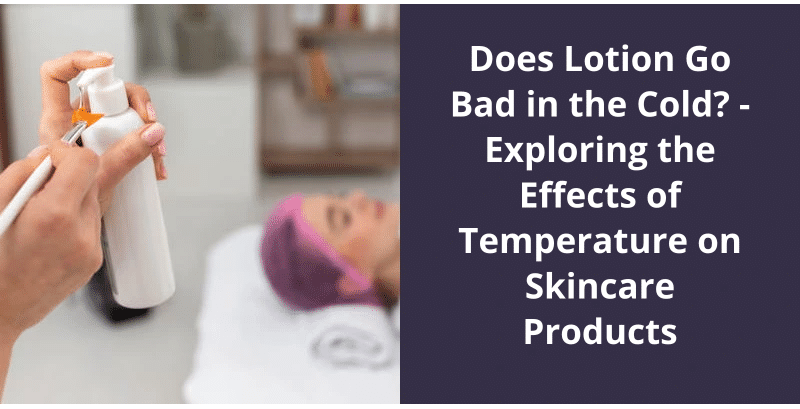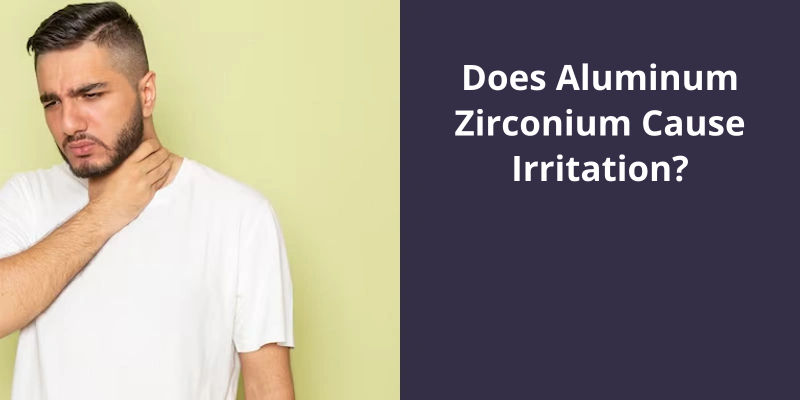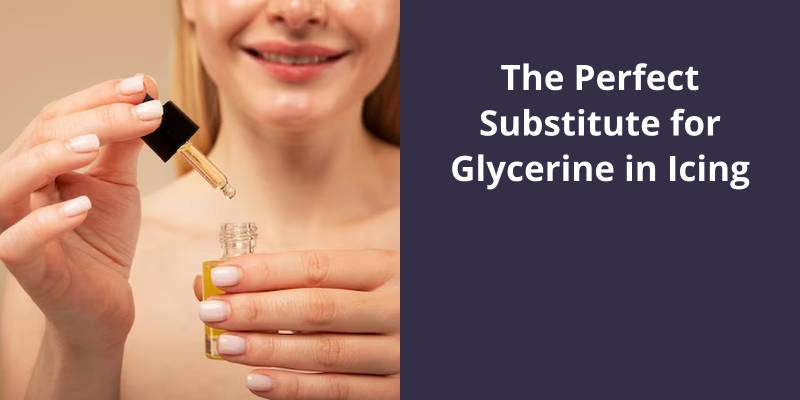Lotion does not typically go bad in the cold, but extreme changes in temperature can potentially affect its consistency and quality. Cold temperatures may cause the lotion to thicken or separate, but the product is usually still safe to use. The product’s shelf life, as indicated on the packaging, is typically determined under normal room temperature conditions. Therefore, storing skincare products like lotion in a cool, dark place is typically advisable to maintain its effectiveness. However, extreme cold, like freezing temperatures, could affect the emulsification process that keeps the lotion’s ingredients blended. Even in this case, the lotion does not “go bad” in a way of spoiling; it just may not work as effectively as intended.

Is It Good to Put Body Lotion on in the Winter?
Moreover, using a body lotion in the winter is crucial due to the harsh environmental conditions. The constant exposure to cold weather and dry indoor heating systems can leave your skin feeling dry and dehydrated. Furthermore, regular use of body lotion can improve your skins overall texture and appearance. It can even help reduce the appearance of fine lines and wrinkles.
As we age, our skin naturally loses it’s elasticity and becomes looser. This is particularly noticeable during the winter months when our skin is exposed to harsh conditions. But using a body lotion can help retain moisture in the skin, which can help improve it’s elasticity and firmness.
Importance of Choosing the Right Body Lotion for Winter Skincare
Choosing the right body lotion is important for winter skincare because colder temperatures and dry air can cause the skin to become dry and flaky. A good body lotion can provide essential moisture and help prevent damage to the skin’s protective barrier. It’s important to choose a lotion that’s thick and hydrating, and includes ingredients such as ceramides, glycerin, and hyaluronic acid.
It’s important to keep in mind that extreme temperatures can affect not only the efficacy of your skincare products, but also their texture and consistency. In fact, freezing temperatures can be just as damaging as high heat. This is especially true for emulsions like lotions, creams, and conditioners, which can become unstable if exposed to freezing temps and then thawed. So, if you’re wondering whether or not it’s bad if skincare freezes, it’s best to avoid subjecting your products to extremely cold temperatures.
Is It Bad if Skincare Freezes?
When it comes to skincare products, proper storage is often crucial for maintaining their effectiveness. However, many people may not be aware of the potential risks associated with exposing skincare products to freezing temperatures. Whether it’s due to seasonal weather changes or accidental mishaps, exposing skincare products to extremely cold temperatures can have some negative consequences.
When products freeze and thaw repeatedly, this can create small cracks or fissures in the packaging that can allow bacteria to grow. This can be especially problematic for organic or natural skincare products, which may be more vulnerable to bacteria growth than synthetic products.
Ideally, this means keeping them at room temperature or slightly cooler, but avoiding extremely cold temperatures. If you live in an area with freezing temperatures, it’s important to take special care when transporting your skincare products – for example, by keeping them inside a warm bag or container.
This may include keeping them away from direct sunlight, keeping them sealed tightly, and avoiding exposing them to high humidity or heat. By taking these steps, you can help ensure that your skincare products remain effective and safe to use over time.
By keeping these products stored at the appropriate temperature and taking care when transporting them, you can help ensure that they remain effective and safe to use over time.
The Impact of Freezing Temperatures on Active Ingredients in Skincare Products
- Active ingredients in skincare products can be affected by freezing temperatures
- Freezing temperatures can cause the ingredients to separate or denature
- This can lead to a decrease in potency or effectiveness of the product
- It’s important to store skincare products properly to avoid exposure to extreme temperatures
- If a product has been frozen, it’s best to discard it and purchase a new one
Source: Products arriving frozen in the mail, can I still use them?
It’s important to understand the individual needs of your skin throughout the year, as seasonal changes can have a significant impact on it’s condition. While moisturizing in both summer and winter is essential, the type of lotion you use and the hydration level your skin requires may vary drastically depending on the season. Let’s take a closer look at the factors that can influence your skin’s needs and how to choose the right lotion for the job.
Should You Use Lotion in Winter or Summer?
As seasons change, so do the needs of our skin. In the summer months, it’s important to use lotion not only to protect against harmful UV rays but also to replenish moisture lost through sweating and exposure to heat. Sunscreen is a must-have in any skincare routine, no matter the season, but in the summer, it’s an even more crucial step to prevent damage from the sun. Additionally, using a lightweight lotion will keep your skin feeling fresh and moisturized all day long.
On the other hand, winter presents a whole different set of challenges for our skin. With indoor heating, cold weather, and heavy clothing, our skin is at risk of becoming dry, itchy, and peeling. During this time of year, hydration is key to keeping our skin healthy and glowing. Using a heavier lotion or cream is recommended to lock in moisture and prevent the harsh winter elements from damaging the skins protective barrier. The goal is to keep the skin supple, hydrated, and protected from the cold wind and dry air.
One common misconception is that those with oily skin don’t need to use lotion, but this couldn’t be further from the truth. Regardless of skin type, using lotion is crucial to maintain a healthy skin barrier. In fact, those with oily skin may benefit from a lightweight, oil-free lotion in the summer months to prevent excess oil production and breakouts. Choosing a non-comedogenic formula will ensure that it won’t clog your pores and cause additional breakouts.
Another important factor to consider when choosing lotion is the ingredients. Look for nourishing ingredients like hyaluronic acid, glycerin, and ceramides to provide deep hydration and strengthen the skin barrier. Avoid ingredients like alcohol, which can be drying and irritating to the skin. Natural ingredients like aloe vera and jojoba oil are also great options for those with sensitive skin or those who prefer more natural, plant-based products.
In summary, using lotion is important year-round to maintain healthy, hydrated skin. In the summer, a lightweight formula with SPF is essential for protection against the sun. In the winter, a heavier, more moisturizing lotion will help combat the dry air and harsh elements. Regardless of skin type, choosing a formula with nourishing ingredients and avoiding harmful chemicals will keep your skin looking radiant and healthy. Dont overlook the power of a good lotion in your skincare routine, no matter the season!
The Importance of Using Lotion on Different Skin Types (Dry, Oily, Combination, Sensitive, Etc.)
Using lotion is crucial for maintaining healthy skin, regardless of skin type. However, it’s important to choose a lotion specifically tailored to your skin type, as the wrong product can cause more harm than good. Dry skin will benefit from heavier, more moisturizing lotions, while oily skin should opt for lightweight, oil-free formulas. Combination skin should use a lotion that addresses both dry and oily areas. Sensitive skin may require a gentle and hypoallergenic lotion to avoid irritation. Using the appropriate lotion will help keep your skin hydrated, balanced, and glowing.
Now that we know that using expired lotion won’t likely cause harm, let’s dive deeper into what may happen if you continue to use it past it’s expiration date.
What Happen if I Use Expired Lotion?
The efficacy of lotion diminishes as it ages, meaning it may no longer be effective at moisturizing your skin. Expired lotion may also have a strange texture or odor, making it less appealing to use. In some cases, it may even cause irritation to sensitive skin. To ensure you’re getting the most out of your lotion, it’s best to use it within the recommended timeframe.
This is especially true for lotions that are packaged in jars, as they’re more likely to be exposed to bacteria and other pathogens. For this reason, it’s a good idea to avoid using expired jarred lotions if possible. Instead, opt for products with pumps or other dispensers, which are less prone to contamination.
If you do decide to use expired lotion, it’s always a good idea to perform a patch test first. Apply a small amount of the product to a small area of skin, such as the inner forearm, and wait 24-48 hours to see if any irritation occurs. If you experience any redness, itching, or other symptoms, discontinue use and seek medical advice if necessary.
To ensure maximum effectiveness and avoid potential issues with contaminated products, it’s best to use skincare products within their recommended timeframe and to perform patch tests before trying new products.
The Potential for Allergic Reactions to Expired Lotion or Other Skincare Products.
- Expired lotion or skincare products may cause allergic reactions in some people.
- Allergic reactions can range from mild irritation to more serious symptoms like hives and swelling.
- If you notice any adverse reactions after using expired skincare products, stop using them immediately and consult a doctor if necessary.
- To avoid allergic reactions, make sure to check the expiration dates on your skincare products and replace them regularly.
- Also, be sure to patch test new products before using them all over your skin to avoid any potential allergic reactions.
It’s common knowledge that heat can be damaging to a wide range of products, and skincare is no exception. Leaving lotion in the heat can’t only cause the product to expire quicker, but it can also impact it’s effectiveness, leaving you without the benefits you were hoping for. The same goes for medications and sunscreen. So, how can you make sure your skincare products are protected from the heat? Let’s find out.
Is It Bad to Leave Lotion in the Heat?
Leaving lotion in the heat can have negative consequences, as the high temperatures can damage the product and reduce it’s effectiveness. When lotions are exposed to heat, the ingredients can break down and begin to deteriorate, causing the product to lose it’s potency and become less effective over time. This is especially true for natural or organic lotions, which are often more susceptible to heat damage.
As the product breaks down, it can become a breeding ground for bacteria and other microorganisms, which can cause skin irritation or even infection when applied to the skin. This is particularly concerning for lotions that are used on sensitive or compromised skin, such as those used to treat eczema or psoriasis.
It’s not just lotions that are affected by heat exposure – medications and sunscreen can also be negatively impacted. Heat can cause medications to break down or become less effective, which can be dangerous for people who rely on these products to manage their health conditions. Sunscreen can also lose it’s effectiveness when exposed to high temperatures, leaving users vulnerable to sunburn and skin damage.
To protect your lotions, medications, and other products from heat damage, it’s important to store them in a cool, dry place. Avoid leaving them in direct sunlight or in a hot car, and consider taking them with you when you leave the house to ensure they stay cool and protected. If you do notice that your lotion or other product has been exposed to heat, it’s best to err on the side of caution and replace it, rather than taking the risk of using a potentially compromised product.
How Can You Tell if a Skincare Product Has Gone Bad or Has Been Damaged by Heat Exposure?
- Check the expiration date on the product packaging. If it’s passed, the product may be expired.
- Look for changes in consistency or texture. If the product has become thick, clumpy, or separated, it may have gone bad.
- Inspect the color and smell of the product. If it’s a foul odor or has changed from it’s original color, it may be damaged.
- Pay attention to any skin reactions after using the product. If you experience redness, irritation, or breakouts, the product may be expired or damaged.
- If the product has been exposed to high temperatures, such as direct sunlight or a hot car, it may be compromised and should be discarded.
Conclusion
In conclusion, it’s essential to store skincare products in optimal conditions to ensure their longevity. Therefore, it’s crucial to keep lotions in a cool, dry place to ensure their maximum efficacy. Additionally, it’s important to remember that skincare products contain harmful chemicals that can harm the environment over time, and it’s our responsibility to use them up responsibly and avoid sending them to landfills whenever possible. By following these simple tips, we can ensure that our skin remains healthy, and we make a positive impact on our planet's health.





